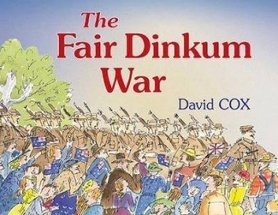The fair dinkum war by David Cox

Allen and Unwin, 2013. ISBN 9781 74331 062 5.
(Age 7+) Highly recommended. Picture book. Looking back. War. World
War Two is in the background of this family's life as it moves to
the city while their father overseers a western sheep station,
allowing the children to be involved in things they had never
experienced before. David remembers his new teacher taking them to
the street to see the American soldiers heading to their camp on one
side of the town. He shows in his illustrations the newspaper of the
day headlining the Japanese bombing of Darwin, and then unfolds the
various ways in which the children do their bit for the war effort:
putting up black out curtains, collecting old tyres. Everyday is
regulated by the ration books, and an air raid shelter is built into
the garden and stocked with canned foods while trenches are dug at
school and air raid practices commence.
But life goes on, the milk cart ambles along the street, the pie
cart stops outside the school, the rubbish cart stops for the
rubbish men to empty their bins behind the horse drawn vehicle.
David Cox shows the reader the things which made up his childhood,
the visits to the local greengrocer, climbing the mulberry tree for
the fresh juicy fruit, men tipping their hats when women walk by,
and then the circus coming to town, exciting all the residents with
their antics. Some children are fearful for their fathers, some
fathers do not return, but the whole community is waiting for the
war to end and things to return to how they were. When the end does
come, they are joyful, and the kites made with the Javanese soldiers
billeted on the other side of town, fly high over their heads.
This is a charming recollection of childhood, chock full of movement
and humour as David Cox's familiar drawings fill the pages. The
beauty of the story and the illustrations creep up on the reader,
enfolding us into the world Cox recreates so well. It pairs readily
with his book published in 2012, The Road to Gunong which concerns
the loss of his family's farm during the Depression.
Both books fit easily into the junior primary curriculum where
classes look at life in other times, and other places, or discuss
families, animals or war and its effects, particularly for those
left at home.
Fran Knight